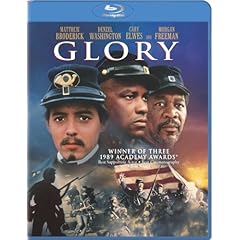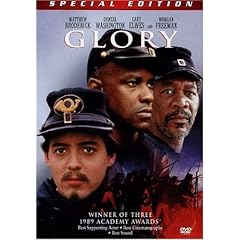
Glory
(1989)

 Prior to the 1990s, it was conventional wisdom in Hollywood that the story populated by minority characters should only be undertaken from the point of view of a white man, preferably played by a popular star. A commonly cited example of this phenomenon, Edward Zwick's Glory primarily tells the Civil War story of the mostly African-American 54th Massachusetts Volunteer Infantry from the perspective of Robert Gould Shaw, the white son of Boston abolitionists. It's a fair approach to "follow the leader" in an account of the 54th, but by prioritizing the real-life Shaw and fictionalizing the African-American soldiers, Glory missed an opportunity to heroize specific historical black men.
Prior to the 1990s, it was conventional wisdom in Hollywood that the story populated by minority characters should only be undertaken from the point of view of a white man, preferably played by a popular star. A commonly cited example of this phenomenon, Edward Zwick's Glory primarily tells the Civil War story of the mostly African-American 54th Massachusetts Volunteer Infantry from the perspective of Robert Gould Shaw, the white son of Boston abolitionists. It's a fair approach to "follow the leader" in an account of the 54th, but by prioritizing the real-life Shaw and fictionalizing the African-American soldiers, Glory missed an opportunity to heroize specific historical black men.
All the same, Glory is powerful film history, illuminating and popularizing a largely unknown story of the Civil War. Early in the picture Shaw (Matthew Broderick) writes of dispossessed slaves, "We fight for men and women whose poetry is not yet written but which will presently be as enviable and as renowned as any." Soon, he's asked to put this moral stance on the line when he's given "a regiment of Negro soldiers" and with it a promotion to Colonel. Not surprisingly, the unavoidably symbolic premiere black infantry unit faced a figurative uphill battle within the Union army before it could face a literal one in an assault on Fort Wagner, which provides the film's climax.
In a depiction that's surprisingly frank--if pitched to modern sensibilities--Shaw is no conventional hero. His lofty ideals consistently clash with reality. In 1862, the Battle of Antietam finds a gung-ho Shaw quickly cowed; grazed by a bullet, he narrowly survives by taking to the ground and passing out. A subsequent scene takes dramatic license by relocating Shaw to a drawing-room party in Boston when he receives a very public assignment to the 54th; blindsided (and suffering from PTSD), Shaw gulps and accepts (in real life, Shaw at first declined the commission from the field).
Alongside childhood friend Major Cabot Forbes (Cary Elwes)--a composite character--Shaw sets to work training the regiment. Their lack of discipline swiftly overpowered by their righteous passion, the 54th soon become as well-trained as--and in Forbes' opinion, better trained than--any white unit in action. Subject to ongoing discrimination, the soldiers remain relegated to manual labor as they wait on uniforms and rifles and shoes.
 Screenwriter Kevin Jarre (working in part from Shaw's letters, Peter Burchard's One Gallant Rush, and Lincoln Kirstein's Lay This Laurel) invents archetypal African-American soldiers: intellectual Shaw acquaintance Thomas Searles (ever-brilliant Andre Braugher), stuttering Jupiter Sharts (Jihmi Kennedy), earthy gravedigger-turned-soldier John Rawlins (a warmly stolid Morgan Freeman), and ornery Private Trip (Denzel Washington, in an Oscar-winning supporting turn). An angry man informed by a lifetime of hurt, Trip is, at one point, wrongfully whipped for desertion, his back already laced with scars from his life as a slave.
Screenwriter Kevin Jarre (working in part from Shaw's letters, Peter Burchard's One Gallant Rush, and Lincoln Kirstein's Lay This Laurel) invents archetypal African-American soldiers: intellectual Shaw acquaintance Thomas Searles (ever-brilliant Andre Braugher), stuttering Jupiter Sharts (Jihmi Kennedy), earthy gravedigger-turned-soldier John Rawlins (a warmly stolid Morgan Freeman), and ornery Private Trip (Denzel Washington, in an Oscar-winning supporting turn). An angry man informed by a lifetime of hurt, Trip is, at one point, wrongfully whipped for desertion, his back already laced with scars from his life as a slave.
Fighting because he can think of no better option, Trip still sensibly asks Shaw, "What do we get?" Even in victory, Trip realizes, African Americans will have a long row to hoe to achieve equal rights. The film depicts Trip and Shaw sharing the responsibility to level the playing field for African-American soldiers. Trip raises a spontaneous insurrection when the soldiers' promised pay is slashed, while Shaw--as penance for failing to connect with his men--opens a can of whoop-ass on the officers standing between the 54th and their well-earned supplies and battlefield action.
The real men of the 54th included Henry James' younger brother and two sons of Frederick Douglass, among others. Douglass himself has a cameo (though, as played by Raymond St. Jacques, he's made up to look at least twenty years older than he would have been, for maximum recognition). Jarre and Zwick make dramatic concessions to streamline the story and others to curry more dramatic empathy--like the misleading suggestion that most soldiers in the 54th were runaway slaves when the converse was true: most were free-born African-Americans.
Still, in its broad strokes, Glory gets at the spirit of a group of previously unsung black heroes, and the filmmaking is of a high caliber. Along with Washington, cinematographer Freddie Francis (The Elephant Man) took home Oscar gold for his painterly work. The swells of James Horner's score (replete with boy's choir) remain memorable and affecting, and Zwick has yet to make a finer film.
 |
|
 |
Glory is a film that has always had an overcast quality to its Oscar-winning photography, something that viewers should bear in mind while appraising the picture quality of its hi-def debut on Blu-ray. The film has never looked better on home video: detail gets a significant upgrade, and the picture retains its grain for a film-like appearance. The dimness of the period photography may seem a bit dated, but that's a good thing in the presentation of this well-respected film, now celebrating its twentieth anniversary. The Dolby TrueHD 5.1 track does a nice job of handling James Horner's pure-toned score as well as the crucial battle scenes.
Almost all of the DVD extras return on Blu-ray, beginning with an extensive director's commentary by Edward Zwick. Missing, unfortunately, is the 2-Disc DVD's Picture-in-Picture Video Commentary with Zwick, Morgan Freeman & Matthew Broderick.
The Blu-ray exclusive Virtual Civil War Battlefield is an interactive map that "highlights some of the key engagements that marked turning points in the course of the war...[and] significant events that led to the outbreak of war, and that came in its aftermath. You can also explore developments involving the brave men of the 54th Massachusetts Volunteer Infantry Regiment."
In "The Voices of Glory" (11:18, SD) historian James O. Horton provides historical context, amid dramatic readings from letters by members of the 54th. The actors are Sean Patrick Thomas, Richard T. Jones and Christopher Birt, and Georg Stanford Brown narrates.
"The True Story Continues" (45:18, SD), narrated by Morgan Freeman, is also a historical documentary, with its narrative assisted by film clips, archival illustrations, and recreations.
"Original Theatrical Making-of Featurette" (7:36) is an EPK promo with behind-the-scenes glimpses and interviews snippets with Zwick, Denzel Washington, Freeman, Cary Elwes, producer Freddie Fields, associate producer Ray Herbeck, Jr., stunt coordinator Bob Minor, and Matthew Broderick.
Two "Deleted Scenes" (5:30 with "Play All" option, SD) come with optional director's commentary, and the disc includes a BD-Live hookup to explore added online content.
 |
| Review gear: |
Panasonic Viera TC-P55VT30 55" Plasma 1080p 3D HDTV
Oppo BDP-93 Universal Network 3D Blu-ray Disc Player
Denon AVR2112CI Integrated Network A/V Surround Receiver
|
Pioneer SP-BS41-LR Bookshelf Speaker (2)
Pioneer SP-C21 Center Speaker
Pioneer SW-8 Subwoofer
|
|---|







